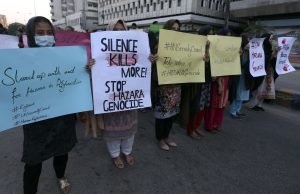Undeniably, all communities in Afghanistan have suffered tremendously, but the Hazara minority has suffered disproportionately because of its distinct ethnic and religious identity. As an ethnoreligious minority, the Hazaras of Afghanistan have endured a long history of discrimination and systematic persecution. The Hazara community has suffered from enslavement, mass killings, and forced displacement throughout the modern history of Afghanistan. This suffering has continued into the present, aggravated alarmingly by the Taliban’s rise to power.
Since the Taliban took over in mid-August 2021, the situation has deteriorated because the group has not been able to, or is unwilling to, stop the Islamic State Khorasan Province (ISKP) and other groups from attacking the Hazaras.
Following the Taliban’s conquest of Afghanistan, ISKP has intensified its operations against the Hazara community. According to Human Rights Watch, hundreds of Hazaras have been killed in suicide attacks in education centers, marketplaces, religious places, and on public transportation since the Taliban’s takeover. According to the United Nations Assistance Mission in Afghanistan (UNAMA), 49 Hazaras have been killed just in the past three months. Besides targeted attacks that ISKP claimed responsibility for, there was also “mysterious targeting of Hazaras” by unidentified and unknown perpetrators, which has added to the complexity of the security crisis. Unclaimed attacks encourage the unknown perpetrators to continue committing crimes without being blamed.
The plight of the Hazara community is worsened by the Taliban’s incitement of sectarian violence against them. The regular public incitement of violence and persecution by the Taliban paves the ground for the perpetration and augmentation of more attacks. Top members of the Taliban government have labeled Shia Muslims, such as the Hazaras, as “infidels.” To cite one prominent example, the Taliban governor of Herat, Noor Mohammad Islamjar, wrote in a book that Shia Muslims are “historical collaborators with infidels.” Such pejorative labels not only excuse the persecution of the Shia Hazara community but worsen the situation as committing violence against a persecuted ethnoreligious group is normalized and justified by Afghanistan’s de facto authorities.
The Taliban’s contribution to inciting violence and fueling systematic hatred has many dimensions. The Ministry of Higher Education of the Taliban has ordered private universities to remove books belonging to the Shia sect. Furthermore, the Taliban have banned marriage between Shia and Sunni Muslims in certain regions of the country because marriage with “infidels” is invalid in the Taliban’s hardline ideology. When the Taliban ascended to power, for instance, they arrested a Hazara man and his Pashtun wife, who had married 15 years ago. It is obvious that the goal of outlawing marriage to Shia Hazaras is to dehumanize the Hazara population and socially isolate them. Indeed, the Taliban’s discrimination against Hazaras further expands the vulnerability of the Hazara community in Afghanistan as they are left unprotected.
The Taliban’s incitement of violence against the Hazara community makes their already vulnerable status worse and creates the conditions for more persecution. The Taliban’s outright dehumanization and justification of murder against Shia Muslims, particularly the Hazaras, by calling them “infidels” creates perilous rhetoric that can drive violence more commonly in Afghan society. Such divisive rhetoric not only creates a hostile atmosphere but also, by implying that violence against Hazaras is justified, may normalize their targeting in the eyes of other communities in the long run.
Moreover, the Taliban’s notorious Ministry of Propagation of Virtue and Prevention of Vice has started extensive arrests of Hazara women and girls from various parts of the country, particularly western Kabul, under the pretext of wearing improper hijabs. Circulating hatred and violence against the Hazara community is not limited to arresting girls and women; some pro-Taliban clerics publicly call for the arrest and torture of Hazara women in mosques.
Openly inciting violence and preaching discrimination against female members of a persecuted group is a two-fold threat as it not only targets them based on their gender, but also because of their ethnic and religious identity. In a global plea regarding the plight of the Hazara community, thousands of citizens of Afghanistan mobilized a global march to appeal for the end of “Hazara genocide” and “gender apartheid.”
Even though the Taliban profess to be providing security in Afghanistan, the Hazara community still falls victim to sophisticated attacks, bombings, and suicide attacks. Under the Taliban, the Hazara community in Afghanistan is subjected to extreme violence and systematic dehumanization. As the world community’s understanding grows of the plight of Hazaras, it must take action to address the incitement to violence and persecution against the community. In order to preserve the rights of the Hazara community and to possibly avert long-term instability in Afghanistan, the current crisis necessitates prompt international engagement.

































